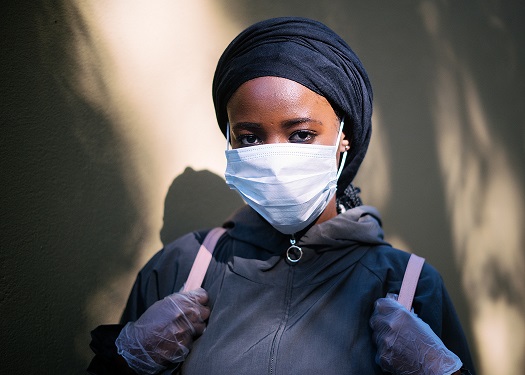
Tips & Tools
Managing your anxiety
How Has COVID-19 Affected Current Students?

Written by Gloria De Salvo
When thinking about the COVID-19 pandemic, this can be a topic that creates higher levels of worry and anxiety for many people. For those who have previously struggled with anxiety, the pandemic has not only increased anxiety, but has also altered the types of support and resources that are available to us. University students have had so many changes occur this year – from spring term ending early, to the switch to online learning, to the reduction of social life, to the limits on what kinds of support available. The Centre for Addiction and Mental Health (CAMH) has conducted research on COVID-19 and the effects on mental health2. In this article, I will break down some of the important statistics, discuss the effects on students, and also provide some resources and tips to help students manage anxiety.

According to CAMH, almost 1 in 10 Canadians have reported that their mental health has worsened since the beginning of the pandemic, and that they have had higher levels of stress in everyday life2. Whether it’s from the fear and uncertainty surrounding their own health, quarantining, physical distancing, finances, or for students - their educational experiences. As a result, there is a higher demand for mental health support, not only from individuals with pre-existing mental health conditions, but also those who have recently developed mental health concerns due to COVID-19; making it even harder for the health system to meet the needs of everyone.
Prior to COVID-19, the mental health system struggled to meet the needs of those looking for support2. As someone who has accessed mental health supports in the past, I have often been faced with long wait times, limited numbers of sessions with a counsellor, and have had to find different resources when others did not work for me. Being a student prior to the pandemic, I knew where I could go to get support, both on and off-campus. Due to the pandemic restrictions, most of the resources have now switched to online support. This can be overwhelming, creating more anxiety, and can be challenging for some people. As a student, I spend so much of my day online doing school work. Now even most of my social life has also switched to online methods, so the thought of having to have a personal conversation about my feelings online can be a nerve-racking thought.

With the growing need for virtual methods of mental health support, CAMH has noted that the mental health sector has had to become more creative in the methods of support they provide2. Within both public support and university campus support, there have been attempts to bring services to students through remote counselling options, social media channels, email, apps, and telemental health supports. There has also been an aim to provide mental health resources, tips and other support through government-run initiatives, as well as on-campus support groups. Groups like Cam’s Kids, on campus mental health support, and even student unions have been using social media as a place to share resources for students, and act as a place to bring students together to help with feelings of isolation. A lot of these organizations and groups have been striving to support students through these challenging times, by providing them with the resources they need, along with a sense of community that can bring other people with mental health concerns together to help support one another.
Although this pandemic can make you feel alone, isolated, worried, and/or anxious, remember that you are not alone in your struggles. You know yourself best and what helps you manage your feelings, and that is what is important during these uncertain times. It is important that you take time for yourself and your mental health, and incorporate self-care tips into your everyday life. Doing things like creating a routine and schedule for yourself, eating regularly and exercising, connecting with others, and setting healthy boundaries regarding social media use and online time, can be very beneficial. The Mental Health Commission of Canada created a “Guide To Student Mental Health During COVID-19” to help students navigate their mental health, as well as provide tips and support to maintain wellness1. I read through this guide and found it to be very informative on where to find support, how to incorporate self-care, ways to adapt to society today, and tips to adjusting to online learning. I would recommend taking a look at this guide www.mentalhealthcommission.ca/sites/default/files/2020-09/covid_19_tip_sheet_student_mental_health_eng.pdf and take advantage of the initiatives being run by Cam’s Kids, especially through their Instagram page. You are doing your best – you are not alone and know that you have resources and the people behind Cam’s Kids to support you!
References:
- GUIDE TO STUDENT MENTAL HEALTH DURING COVID-19. (2020). Retrieved 2020, from https://www.mentalhealthcommission.ca/sites/default/files/2020-09/ covid_19_tip_sheet_student_mental_health_eng.pdf
- Mental Health in Canada: Covid-19 and Beyond CAMH Policy Advice. (2020, July). Retrieved November, 2020, from http://www.camh.ca/-/media/files/pdfs---public-policy-submissions/ covid-and-mh-policy-paper-pdf.pdf
- All
-
29 Nutrition
Nutrition
- 73 Mindfulness and Relaxation
- 27 Student Life
- 8 Exercise
- 51 Treatments & Therapies
- Anxiety Resources

Don't see what you're looking for? Send us an email!
©Copyright 2024 Cam’s Kids powered by Kids Help Phone
Not-for-Profit Organization. B/N: 921508-5
Thanks for visiting Cam's Kids. Please remember...
Cam's Kids is not a service provider.
If you are in crisis, please call 911 or go to your nearest emergency department. For free, confidential counselling, contact Good2Talk or Kids Help Phone.
Post-secondary students: find your local crisis resource here.

